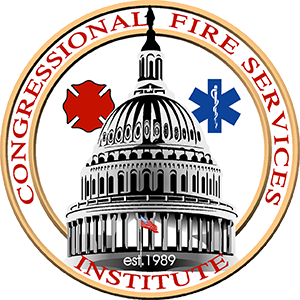CFSI Remarks Regarding Reauthorization of AFG, SAFER, and the U.S. Fire Administration
Bill Webb, Executive Director, Congressional Fire Services Institute
Good morning. My name is Bill Webb and I serve as Executive Director of the Congressional Fire Services Institute, a nonprofit organization designed, in part, to bring national fire service organizations to the table and develop unified messages that our organizations can collectively deliver on Capitol Hill about the needs and challenges of our nation’s firefighters and emergency services personnel.
Standing behind me are representatives of CFSI’s National Advisory Committee, comprised of 38 national fire service organizations, who are here to demonstrate their support for passage of federal legislation to reauthorize the Assistance to Firefighters Grant Program, the Staffing for Adequate Fire and Emergency Response Grant Program and the United States Fire Administration. AFG, SAFER, and USFA are critical to ensuring that America’s firefighters and EMS personnel have the equipment, training, and staffing levels they need to keep themselves and their communities safe.
Firefighters and emergency services personnel respond to over 36 million emergency calls annually, including fires, medical emergencies, and both natural and man-made disasters. They are on the front lines during pandemics and the opioid crisis, placing themselves at great risk to save others. They are called first responders for a reason: because they never hesitate to respond when an emergency call is placed, regardless of the time of year, hour of day or level of threat to their own health and safety.
Congress first authorized the Assistance to Firefighters Grant Program in 2000, one year before 9/11, to address the baseline needs of fire departments across the country. To this day, funds are used to purchase basic equipment such as turnout gear, self-contained breathing apparatus, portable communication systems, and personnel location devices.
These are essential pieces of equipment firefighters need to save lives – their own and the lives of the citizens they protect. And yet many fire departments still lack the necessary equipment, training and staffing to perform their missions safely and effectively.
In 2004, Congress authorized the Staffing for Adequate Fire and Emergency Response Grant Program in response to concerns over the adequacy of firefighter staffing in career and volunteer departments. These funds have been used by fire departments across the nation to increase the number of firefighters to help communities meet industry minimum standards.
This is why we urge Congress to continue their support of these grant programs and the United States Fire Administration, our lead federal agency and our voice at the federal policy level.
I’m honored to share the podium with my esteemed colleagues from other national fire organizations who will offer their own thoughts and perspectives on why we call on Congress to reauthorize the Assistance to Firefighters Grant Program, the Staffing for Adequate Fire and Emergency Response Program, and the United States Fire Administration.
—
As you have heard from today’s speakers, fire and EMS personnel face enormous challenges in performing their critical work. When 9-1-1 is called, every community across the country relies on its fire and EMS personnel to respond regardless of the incident type.
The AFG and SAFER grant programs have had a tremendous positive impact in addressing the unmet needs of fire departments across the nation – needs including basic equipment and training, staffing, fire prevention and safety programs, and research.
The United States Fire Administration is the lead federal agency for our nation’s fire and emergency services, providing a leadership role in the areas of technology and research, training, data collection, and public safety education.
Thirty-nine national fire service organizations stand to call on Congress to reauthorize the AFG and SAFER grant programs and the United States Fire Administration.
